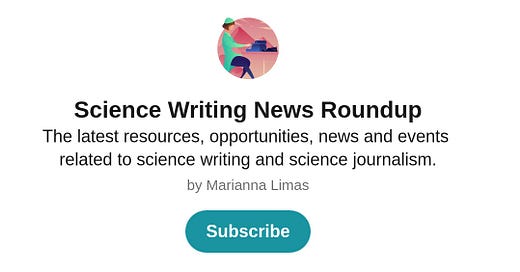✍️Science Writing News Roundup #49 (June 20, 2021)
Fostering diversity: Inclusive mentoring of early career science writers
📣 News and articles
Head of Independent Sage to launch international climate change group. Several of the world’s leading scientists plan to launch an independent expert group this week to advise, warn and criticize global policymakers about the climate and nature crises. The new group will issue monthly updates about the state of the global environment at meetings that will be open to the media and the public.
Idea Grants help science writers reach diverse audiences and navigate mental health issues. Three projects aiming to empower science writers and communicators to more effectively reach diverse audiences and to express and manage pandemic-related mental health issues have been selected by NASW’s Grants Committee to receive Peggy Girshman Idea Grants.
The causes of bad science reporting. “Various studies over the last decade or so have shown that journalists, while all too eager to participate, are often not the source of misreporting of science news. Much of it can be traced back to the press release, and even to study authors themselves,” writes Steven Novella, Founder and Executive Editor of Science-Based Medicine.
First National Science, Health and Environmental Fellows selected. The Council for the Advancement of Science Writing (CASW), the Association of Health Care Journalists (AHCJ), and the Society of Environmental Journalists (SEJ) have announced the selection of the inaugural class of the National Science-Health-Environment Reporting Fellowships.
📼 Video
👋 Resources and tips
Nut graf and lead duos that point readers in the right direction. The inverted pyramid. The women's page. Unlike those throwbacks, the nut graf is a print convention that's aged well — and that digital stories need. It's a statement that reveals the point quickly and all at once, and tells the reader why they should care. Without it, stories can ramble and readers will wander. The nut graf and the lead are a package deal; if you need inspiration for effective pairings, read NPR Training's latest post.
How journalists can overcome math anxiety. If you are a science journalist, there is no way of escaping math. For some, that's a comfortable partnership. For others, the prospect of dealing with mathematics — from simple equations to complex statistics — is a source of persistent anxiety. In this article for The Open Notebook, Tatiana Harkiolakis discusses strategies that journalists can use for overcoming math anxiety.


🎭 Opportunities
Science communication competition: How can the development and use of new food processing technologies help the food industry meet the demands of the UN’s sustainable development goals? This competition is open to students studying at a UK university or an IFST accredited course.













📺 Events
Global to Local: Warming Stripes and Realtime Climate (June 21, 2021)
Misinformation or censorship: science reporting and social media (June 22, 2021)
Online SciComm Coworking Session (June 22, 2021)
Future of Science Communication Conference (June 24-25, 2021)
How to Write Popular Science Books (June 26, 2021)
📚 Jobs and internships
Newsperson, Medicine and Science, Associated Press, US-based
C&EN Business Reporter, American Chemical Society, US-based
Senior Editorial Assistant, American Cancer Society, US-based
Managing Editor, GEN Biotechnology, US-based
Science Writer, CNET, Remote
Cancer Reporter, STAT, Boston, MA
Editorial Director, Science & Recode, Vox Media, New York, NY or Washington, DC
Associate Editor, The Optical Society, Washington, DC
More jobs 👉Science Writing News Roundup #48
👉 Don’t miss any updates from the Science Writing News Roundup:
Worried you missed something? See previous newsletters here. What would you like to see in the newsletter? Please send me your suggestions by replying to this email: sciencewriting@substack.com 😃
Thanks for reading. How about sharing this with a friend? 💙
Top image: Stockholm Public Library. Credit: Alexandre Van Thuan


